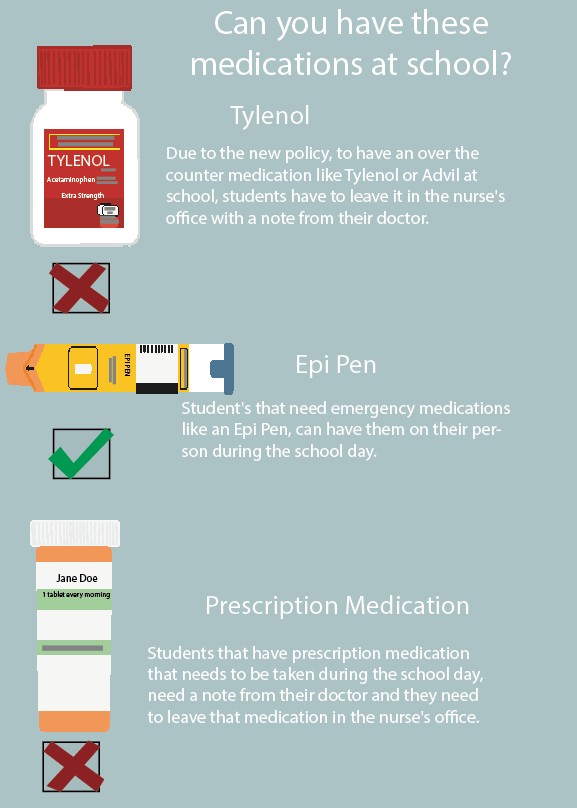District changes to medication policy impacts students
Whether it’s quick relief from a cough, irritating seasonal allergies, or menstrual cramps; Advil, cough drops, and Tums could surely be found in a student’s backpack last year.
October 18, 2022
Whether it’s quick relief from a cough, irritating seasonal allergies, or menstrual cramps; Advil, cough drops, and Tums could surely be found in a student’s backpack last year.
At the end of the 2021-2022 school year, Austin Independent School District (AISD) implemented a new policy prohibiting high school students from carrying any kind of over the counter medication with them, and requiring them to register it through the office. The policy specifically affects school nurse, Shari Peterson, as she is responsible for administering medications to students.
“Last year, students were able to carry over-the-counter medications, they were allowed to self-carry, this year, they are not allowed to self-carry anymore unless its an inhaler, diabetes meds, or epipen, any kind of emergency meds,” Peterson said. “The doctor has to have authorization for all those medications.”
According to bowie.austinschools.org, to keep medication in the nurse’s office, all medications require a physician’s order, indicating that they are for this year, and a parent’s authorization with all medication order requirements included such as strength and dose listed. Knowing that all students must go to the office when needing to take medication, senior Maya Dougherty knows how students will be affected this year.
“I feel like this will be an inconvenience to students who get migraines and cramps easily,” Dougherty said. “This will also mean more class missed for students who need medication for everyday things like stomachaches and headaches.”
According to cdc.gov, 27 percent of adolescents aged 12-19 take prescription drugs. This affects students at Bowie taking prescription medications heavily, as the Bowie student body fits into this demographic. Sophomore Audrey Nixon is impacted by this AISD policy too.
“I think AISD is trying to protect us from potential overdoses and by having us put [medications] in the office is reducing the risk,” Nixon said.
Nixon also knows that the policy affects nurses at Bowie, not just students.
“Nurses have to keep track of all the meds and every time students want or need to take meds, they have to go all the way to the office,” Nixon said.
On bowie.austinschools.org, AISD has made these changes to follow the guidelines supported by the Board of Nursing, the National Association of School Nurses, and the Texas Education Code. Additionally, with the increased focus on current mental health concerns, these policies aim to keep students safe by limiting their ability to ingest large amounts of medication, share/sell medications, or use medications inappropriately or in other ways that violate existing policies.
“I understand the safety part of the new policy but personally, I think the students would feel more comfortable having their medicine on their body and not with an adult they hardly know,” Nixon said.
Peterson similarly notices the pros and cons to the new policy.
“I’m sure it was made for the safety of the kids, but I don’t know the exact reason why, maybe so there’s no accidental anything,” Peterson said. “There are definitely mistakes and accidents that happen, but I feel that the rule takes away your independence a little bit.”
In addition to students now being unable to carry medications, the school office does not carry over the counter medications for students to access. If students need to take medications during the school day, they are required to bring their own unopened bottle with a written and signed request by a parent or guardian and physician.
“Personally, I often have cramps and migraines at school and I also need to take probiotics, so it’s best for me to take them during lunch and have access to them on my own,” Dougherty said.
While some students find it inconvenient, there are consequences to follow if a student does not abide by the medication policy.
“[The first action taken is] to call [student] in and talk to them and find out why and just let them know that we have to inform their parents that they have to have a sheet from the doctor for the meds, because some students don’t know,” Peterson said. “If it’s a continuing thing, an administrator might have to get involved at that point.”
Under the section regarding Health Service requirements to remain in school on the https://www.austinisd.org website, all prescription and non-prescription medications will require medical orders from providers and parental consent for student use/administration on campus. The Health services department works closely with the AISD School Health Advisory Council, a board-appointed group of parents, community members, students, and school staff working together to improve the health of all students and families through coordinated school health programs.
“I think the administration put the policy in place because of the epidemic of drug addiction and the mental health crisis across high school students,” Dougherty said. “While the policy is somewhat inconvenient, I am hopeful that it prevents any overdoses and keeps students safe.” Additional reporting and data collected by Madison Coleman.










